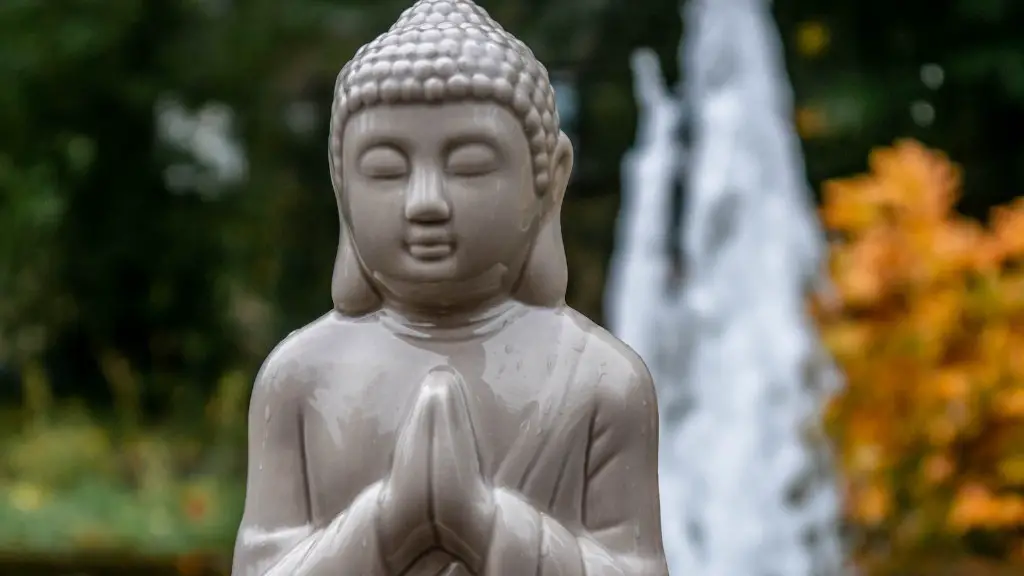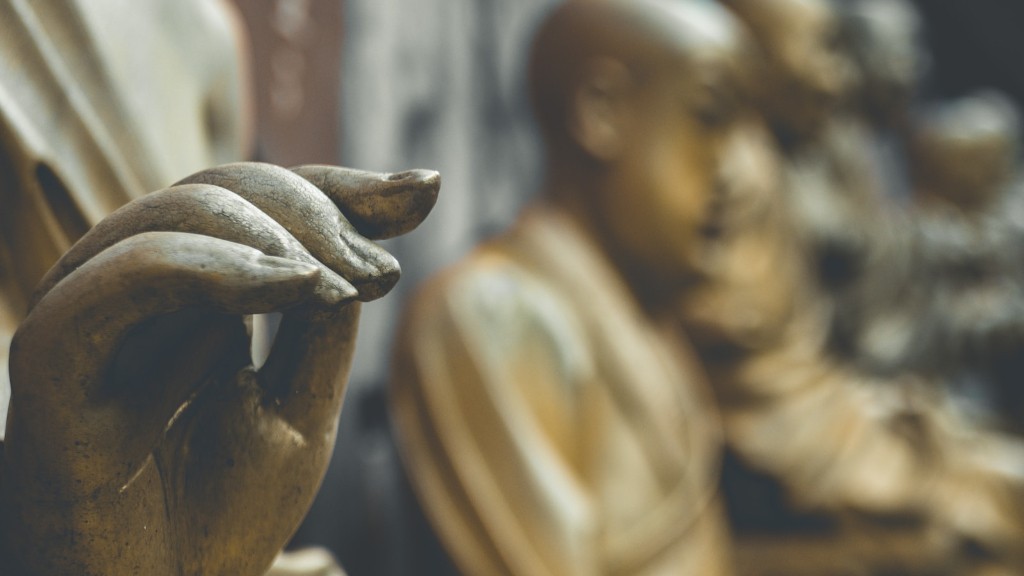Hinduism has been a major religion since ancient times, said to have originated in India over 5000 years ago. It is the world’s third-largest religion, with about 1 billion followers worldwide. Many Hindus not only believe in a single omnipotent and omniscient God, but also revere dozens and hundreds of lesser gods, with varying roles and special abilities, often associated with various aspects of life and the natural world. Does Hinduism have one God?
The answer to this question is more complex than a simple yes or no. There are a number of schools of thought within Hinduism, ranging from the monotheism of Vaishnavism to the polytheism of Shaivism, each of which offers a different view. On the one hand, Hindus who adhere to Vaishnavism believe in a single, divine entity, or a “Supreme Being” known as Brahman. Brahman is seen as the Creator and Sustainer of the Universe, as well as being its very essence. On the other hand, Hinduism’s polytheistic schools such as Shaivism and Shaktism recognize multiple gods. This can be either in the form of many manifestations of a single underlying divine force (known as Adi Parashakti or “The Prime Source”) or the concept of multiple distinct gods, such as Shiva, Vishnu, and Shakti.
Hindus may choose to worship one god or many gods, depending on their beliefs. Many adherents of Vaishnavism, for example, will focus their devotions on one particular deity such as Krishna or Vishnu, while those who follow Shaivism may concentrate on Shiva or one of his manifestations. Worship of multiple gods is common in most Hindu schools, and it is not uncommon for people to have personal favorites among the Hindu pantheon.
The idea of one God or multiple gods is a matter of personal interpretation. For some Hindus, there is a single, omnipotent and omniscient God beyond all the individual divine forms. Others view the various gods as aspects of Brahman, and for many, Brahman is seen as the underlying source of all gods. Ultimately, it is the individual’s choice as to how they view the divine forces and what role, if any, faith has in their life.
Some Hindus may not worship any of the gods at all but still believe in the concept of Hinduism’s underlying existence as a singular divine entity. This is known as “nirguna bhakti” or “devotion to the formless”. This is a form of Hinduism which seeks to transcend all the individual gods and instead focus on a personal relationship with the divine force that is the source of all things.
The concept of one God or multiple gods is a matter of philosophical discussion among Hindus and is not a litmus test of religious or spiritual correctness. Hindus have a rich diversity of beliefs and many different interpretations of the divine, varying from school to school and person to person. Ultimately, it is up to the individual to determine their own views and practice the faith that best suits their needs and beliefs.
Hinduism and Other Religions
Many of today’s major religions, including Christianity, Islam, and Judaism, emerged from the monotheistic beliefs of ancient Middle Eastern civilizations. However, Hinduism differs from all of these religions as it does not preach the belief in a single God. Instead, Hindus view their faith as a “living tradition”, constantly evolving and adapting, where new gods and ideas may be added to the pantheon of Hindu gods over time.
Hinduism has been a major influence on many religions in the West, particularly Buddhism, Jainism, and Sikhism. It has also had a significant impact on Christianity, providing inspiration and theological precedent for the concept of a personal God who can be redeemed by love. Similarly, some forms of Islam, particularly Sufism, have parallels to Hinduism in terms of their emphasis on a personal relationship with the divine force.
Hinduism also has often been referred to as the “mother of all religions”, referring to its long history, diverse membership, and vast array of gods. Many Hindus see Hindu belief as a source of strength and knowledge, believing that the Hindu system of scriptures, rituals, and gods has been passed down from generation to generation from ancient times.
Role of Sacred Texts in Hinduism
The sacred texts of Hinduism are known as the Vedas and are divided into two major collections: the Rig-Veda and the Atharva-Veda. The Rig-Veda is the oldest of the two and is focused on praise and worship of various gods. The Atharva-Veda, which is of much younger origin, is more concerned with spells, charms, and magical incantations. Both collections are especially important to Vaishnavism, as they are a source of philosophical and religious teachings on the nature of reality and the nature of the divine.
The Vedas are complemented by the Upanishads, a collection of philosophical and spiritual texts which explore the concept of Brahman, the single divine force that is seen as the foundation of the Universe. Other texts such as the Bhagavad Gita and Ramayana also play an important role in Hinduism, exploring the journey of the divine from the physical to the spiritual realm.
In addition to these religious texts, Hinduism also has a strong oral tradition, with tales, folk stories, and epics being passed down the generations. Many of these are intertwined with Hindu gods and goddesses and help to bring the faith alive for followers in many parts of the world.
Symbols in Hinduism
Hinduism has an array of symbols that represent its various gods, each of which has its own interpretation and meaning. These symbols are often used in ritual and art to represent divine forces. The most common Hindu symbol is the “om”, a sacred sound that represents the underlying unity of all existence. Similarly, the swastika is a symbol of luck and is found in many traditional Hindu ceremonies. Other symbols include the lotus, which represents the unfoldment of creation and rebirth.
The Himalayan regions of India are home to many symbolic temples and shrines which are filled with statues, paintings, and sculptures of gods and goddesses from various Hindu schools of thought. These symbols serve to remind Hindus of the various divine entities that exist and the many ways in which they can be experienced.
Hindu symbols are also used to adorn clothing and jewelry, reminding Hindus of their faith and providing them with spiritual protection and guidance. In some cases, Hindu symbols may be used to ward off evil spirits or to attract good luck.
Festivals in Hinduism
Hinduism is known for its many colorful and lively festivals, which often incorporate a variety of religious symbols, such as gods and goddesses. Some of the most popular Hindu festivals are Diwali, Holi, and Navratri, each of which celebrates a different aspect of the faith. Hindus often wear traditional clothing and participate in rituals such as lighting candles, offering prayers, and making offerings to the gods as part of the celebrations.
Hindus also celebrate a variety of local festivals throughout the year, in areas where Hinduism is practiced. These festivals often involve intense celebrations and rituals associated with local gods and goddesses, with unique symbols and interpretations.
Hindu festivals are known for bringing people together in celebration and for providing an opportunity for spiritual reflection and family bonding. They are an important part of Hindu culture, providing a focus for the faith and helping to bring people of all backgrounds together in a spirit of unity.
Tradition and Rituals in Hinduism
Hindus often practice a variety of rituals, depending on the school of thought they follow and the time of the year. These can range from simple acts of devotion and prayer to elaborate ceremonies. Rituals often involve an offering of flowers, incense, and water to the gods, and the recitation of mantras and prayers. Additionally, Hindus may practice ceremonies such as puja, a meditation ceremony for contemplating the divine and expressing gratitude for the blessings of life.
Hindu rituals and ceremonies are often focused on the home and family. Many Hindus will practice daily rituals, such as lighting candles and offering water to the gods. Other rituals, such as fire ceremonies and marriage ceremonies, are intended to be shared with the community and involve the participation of family and friends.
Rituals and ceremonies are an important part of Hindu culture, providing an outlet for devotion, reflection, and spiritual growth. Through these rituals, Hindus are reminded of the power of the divine and the importance of honoring the cycles of nature.

